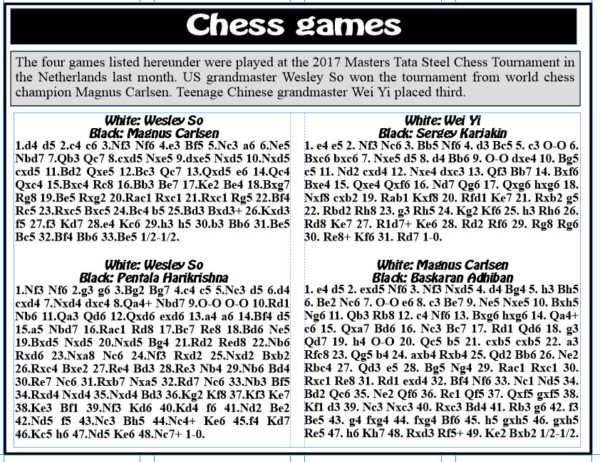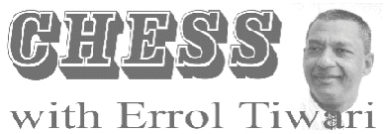 A shadow is crossing the path slowly but gradually on chess in Guyana. We have greeted the second month of 2017 without having any indication of where we are heading, how we will get there and if there is an intention for the renewal of regular chess activity.
A shadow is crossing the path slowly but gradually on chess in Guyana. We have greeted the second month of 2017 without having any indication of where we are heading, how we will get there and if there is an intention for the renewal of regular chess activity.
The Guyana Chess Federation (GCF) was not successful in organizing a national senior chess championship for 2016. The national schools’ championships were inexplicably erased without explanation three years ago when the current administration assumed office. Tourna-ments are haphazard and without form. What is the purpose of irregular chess competitions? Are we preparing for something, anything? Are we content only to make some noise when we attend the two-week biennial chess Olympiad competition? Should we lessen our local chess activity for two years until the next Olympiad approaches?
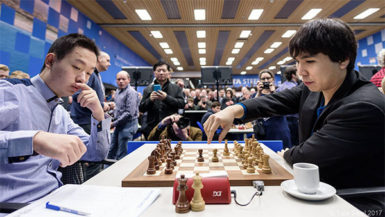
For the widening of chess locally, we have a responsibility to take chess to the people. An energetic way to accomplish an exercise such as this, is to proceed toward the schools. This column has tiredly pleaded for the elected authority to begin negotiations for a structured schools chess programme. Are we timid to negotiate? President Kennedy addressed the question of negotiations unambiguously: “Let us never fear to negotiate.”
We have to start somewhere, and the place to make that start, in my unpretending opinion, is at the schools. Going to the schools speaks of more importance than playing in the chess Olympiad. When I joined the Foreign Ministry, during one of his enlightening conversations, Minister Rashleigh Jackson carefully noted that a Foreign Service Officer has to be trained at headquarters in his home country, before he becomes eligible to represent his nation overseas. When Bangladesh became a nation, it began a serious cricketing programme within the school system. Today, Bangladesh is a successful Test cricketing nation, and has become known throughout the world for its vitality in cricket.
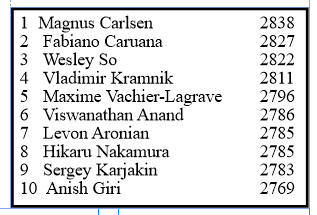 If we do not include the schools in chess, if we do not seek to expand the game, it will continue to be impoverished and would eventually suffer an unnatural demise and that would be a pity. It is my fervent belief, that a structured schools’ programme can be instrumental in attracting sponsorships from deep-pocketed and thriving business entities. During the 1990s, I taught chess for free at Queen’s College and even held a tournament. Then rice magnate Beni Sankar called me in and paid me a handsome stipend to continue with the work of imparting my knowledge of chess to students. I was subsequently informed that one of my promising female chess students at QC, placed third worldwide in the US-administered SAT. This is my plea to the GCF: Please consider school chess.
If we do not include the schools in chess, if we do not seek to expand the game, it will continue to be impoverished and would eventually suffer an unnatural demise and that would be a pity. It is my fervent belief, that a structured schools’ programme can be instrumental in attracting sponsorships from deep-pocketed and thriving business entities. During the 1990s, I taught chess for free at Queen’s College and even held a tournament. Then rice magnate Beni Sankar called me in and paid me a handsome stipend to continue with the work of imparting my knowledge of chess to students. I was subsequently informed that one of my promising female chess students at QC, placed third worldwide in the US-administered SAT. This is my plea to the GCF: Please consider school chess.
Chess is being played vigorously overseas. In January, the elite Masters and Challengers Tata Steel tournaments were completed. US grandmaster Wesley So is becoming a thorn in the flesh of the planet’s top players. Hardly anyone expected him to excel in the way that he did during 2016 much less to be honoured with the Chess Player of the Year award. So won four massive tournaments last year. At the Tata Masters, he continued his winning ways, relegating World Champion Magnus Carlsen into second place in the tournament. Will Russian grandmaster Sergey Karjakin qualify again to face Carlsen for the crown? Seriously, So would have something to say about that. In the FIDE ranking system, So has climbed 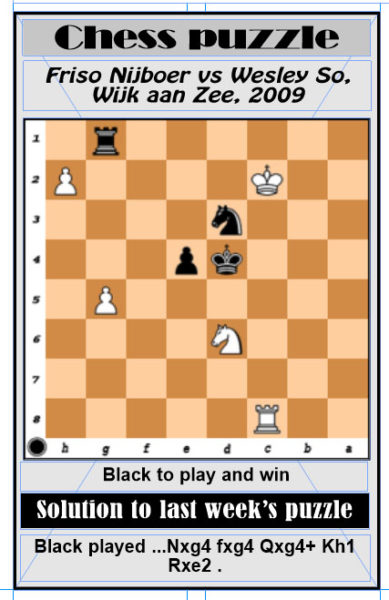 emphatically in the noted points table. He gained 50 points in the past six months. The February FIDE points table has been published and the top ten looks like this:
emphatically in the noted points table. He gained 50 points in the past six months. The February FIDE points table has been published and the top ten looks like this:
